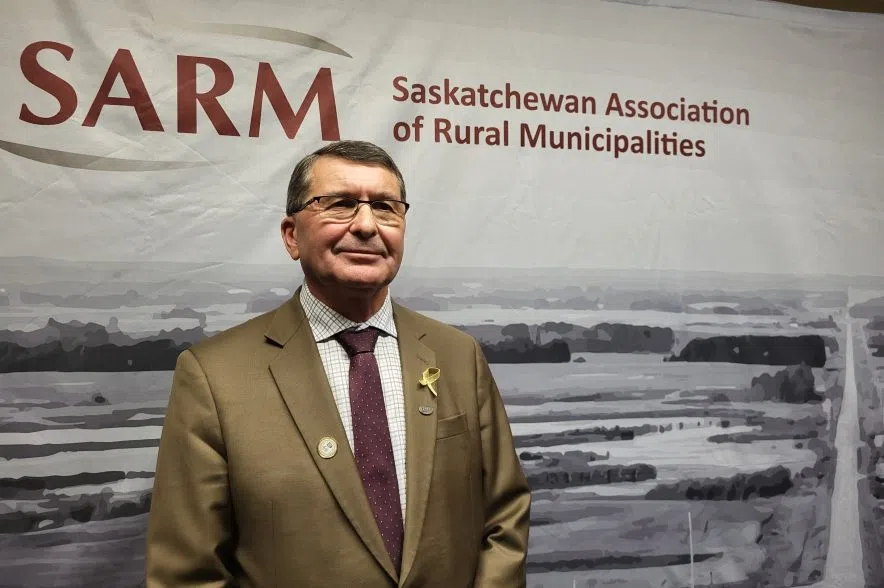Shovels are expected to go into the ground for the long-awaited Lake Diefenbaker irrigation project next year, and that comes as a relief to the president of the Saskatchewan Association of Rural Municipalities (SARM).
Ray Orb has been calling for construction to start on Phase 1 of the project for quite some time. He said the government’s announcement is promising.
“On the first phase, there’s infrastructure already in place and that’s why we did lobby for Phase 1 and Phase 2 to expand quickly because we thought that was a low-hanging fruit …,” Orb told reporters at SARM’s annual convention Thursday.
The project was originally announced in July of 2020 as a $4-billion plan, but Premier Scott Moe said Thursday he expected the cost to be much higher. The first phase was expected to cost $500 million but now it’s expected to cost $1.15 billion, which will be shared by the province and producers.
It was initially expected to receive funding from the federal government, but discussions between the provincial and federal governments have apparently fizzled out.
Orb said SARM still has lingering questions about how much individual producers will have to pay but said irrigators would still be willing due to the “huge” benefit.
“With the expansion, we’re not sure about the cost yet and I don’t think the province has figured that out but we’d be wanting to sit in on some of the conversations to see what the costs actually are,” Orb said.
“We are definitely a strong proponent of the federal government putting in a share and we assumed at the beginning of this project … that the federal government was going to be there.”
Moe said the project will allocate the funds for the project as it moves along.
“We haven’t worked out all the shares as of yet, but we will be working through that from here on,” Moe said Thursday.
“The important thing is to get a step forward and get the project started and then as producers come online, we’ll be able to have a formula ready so that they can participate and they will cost-share as part of the project.”
Moe did not rule out the possibility of receiving funding from the Canada Infrastructure Bank (CIB), though he expressed some doubts about its efficacy.
“We haven’t really found it to be a whole lot more advantageous than just loaning money or utilizing dollars that maybe the province has. If it would be more advantageous, I think it’s something that we would certainly look at,” Moe said.
According to the CIB’s Q3 2023-24 Market Update, more than 35 projects it has invested in are in active progress and two have been completed.
On Thursday evening, the Federation of Sovereign Indigenous Nations (FSIN) issued a media release highlighting the organization’s concerns over the Lake Diefenbaker project.
“FSIN is deeply troubled by the absence of meaningful consultation with First Nations in Saskatchewan regarding this project and with the lack of comprehensive impact assessments,” Chief Bobby Cameron said in the release.
“Our Inherent and Treaty Rights must be respected, and First Nations must be included in these major project decisions that impact our traditional lands that we have been stewards of since time immemorial.
“The current state of water in Saskatchewan is dire, with record low water levels in 2023 and projections for 2024 looking even worse. Responsible use of our collective water resources is paramount.”
The release also noted potential environmental risk connected to the project. Specifically, it raised concerns about impacts on soil, water availability and quality, ecosystem health and wildlife.
“Despite commitments to consultation, there has been a concerning lack of transparency and inadequate engagement throughout the project’s planning stages,” the release read.
Moe said the province has done a “number” of environmental assessments and has ongoing duty to consult work through the Saskatchewan Builds Corporation to ensure the process is environmentally responsible and respectful of Indigenous communities and others who might be affected by the project.
“Ultimately at the end of the day, what the project will provide is not only water security for a higher-value agriculture production but water security also for a number of communities as we work our ways through phase 1, 2, 3 and 4,” Moe said.
The premier also said the project would provide water security not only for industries currently in Saskatchewan, but industries the province wants to attract.
FSIN Second Vice Chief Dutch Lerat said prioritizing the interests of a select few over the water security of all Saskatchewan people is “shortsighted and irresponsible.”
“We insist on thorough, inclusive impact assessments, independent reviews and meaningful consultation with First Nations in Saskatchewan to be completed before considering whether to proceed with these significant developments,” Lerat said in the release.











